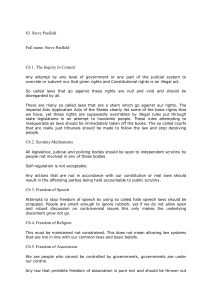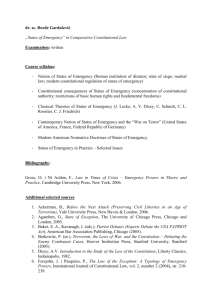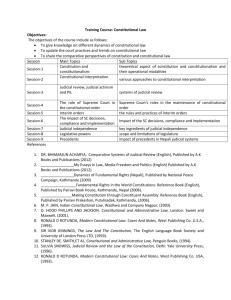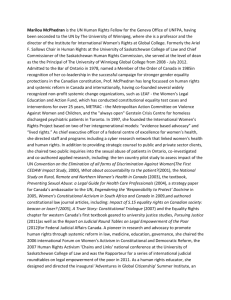with a specific course requirement may also be addressed by other
advertisement
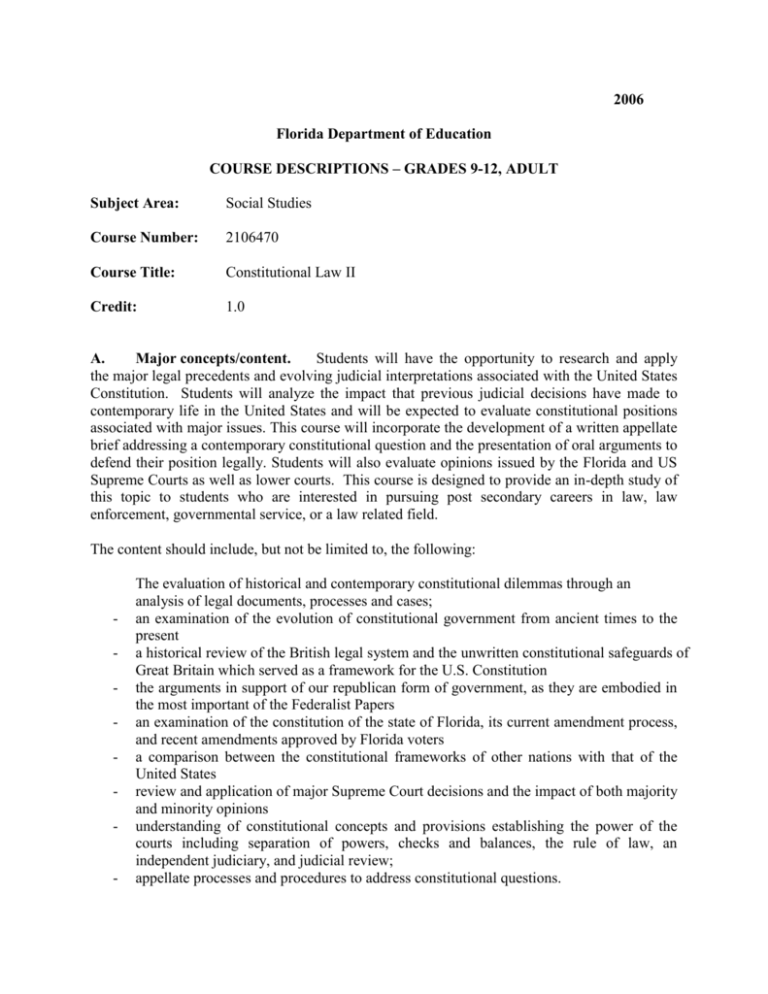
2006 Florida Department of Education COURSE DESCRIPTIONS – GRADES 9-12, ADULT Subject Area: Social Studies Course Number: 2106470 Course Title: Constitutional Law II Credit: 1.0 A. Major concepts/content. Students will have the opportunity to research and apply the major legal precedents and evolving judicial interpretations associated with the United States Constitution. Students will analyze the impact that previous judicial decisions have made to contemporary life in the United States and will be expected to evaluate constitutional positions associated with major issues. This course will incorporate the development of a written appellate brief addressing a contemporary constitutional question and the presentation of oral arguments to defend their position legally. Students will also evaluate opinions issued by the Florida and US Supreme Courts as well as lower courts. This course is designed to provide an in-depth study of this topic to students who are interested in pursuing post secondary careers in law, law enforcement, governmental service, or a law related field. The content should include, but not be limited to, the following: - - The evaluation of historical and contemporary constitutional dilemmas through an analysis of legal documents, processes and cases; an examination of the evolution of constitutional government from ancient times to the present a historical review of the British legal system and the unwritten constitutional safeguards of Great Britain which served as a framework for the U.S. Constitution the arguments in support of our republican form of government, as they are embodied in the most important of the Federalist Papers an examination of the constitution of the state of Florida, its current amendment process, and recent amendments approved by Florida voters a comparison between the constitutional frameworks of other nations with that of the United States review and application of major Supreme Court decisions and the impact of both majority and minority opinions understanding of constitutional concepts and provisions establishing the power of the courts including separation of powers, checks and balances, the rule of law, an independent judiciary, and judicial review; appellate processes and procedures to address constitutional questions. B. Special note. Students earning credit in this course may not earn credit in Constitutional Law (2106410). The course requirements for this honors course are consistent with Constitutional Law, course number 2106410. Additional requirements have been developed to provide for in-depth or enriched study of the course. The district may also develop more stringent requirements. C. Course Requirements. These requirements include, but are not limited to, the benchmarks from the Sunshine State Standards that are most relevant to this course. Benchmarks correlated with a specific course requirement may also be addressed by other course requirements as appropriate. Some requirements in this course are not addressed in the Sunshine State Standards. After successfully completing this course, the student will: 1. Understand the philosophical and historical foundations of the Constitution as: state of nature, natural rights philosophy, republicanism, popular sovereignty, and the evolution of modern concepts of individual rights. (SS.C.1.4.2) 2. Compare and contrast the relationship between the British legal system and the unwritten constitutional safeguards to the American version of constitutionalism. (SS.A.4.4.5) 3. Evaluate ways in which the Florida Constitution affects the lives of Florida residents and evaluate the extent to which its constitutional amendments will impact our citizens in the future. (SS.C.1.4.3) 4. Analyze important documents preceding the Constitution such as the Magna Carta, The Declaration of Independence, The Articles of Confederation, The Federalist Papers, and the Anti-Federalist Papers. More specifically, The Federalist Papers 10, 39, 47, and 78 – 83 shall be included in the course of study. (SS.A.4.4.3) (SS.A.4.4.4) 5. Articulate the necessity for separation of powers, checks-and-balances, the rule of law, an independent judiciary, and judicial review. (SS.C.1.4.3) 6. Analyze the historical evolution of the Bill of Rights, minority rights, the expansion of constitutional protections under the Fourteenth Amendment, and the road to universal suffrage. (SS.A.5.4.7) 7. Examine the legal systems and constitutional safeguards for preserving civil liberties in other nations and compare these with the procedural safeguards established in the U.S. legal system (e.g. comparative studies of the various Bills of Rights). (SS.C.2.4.3) 8. Hypothesize the constitutionality of specifically proposed laws to evaluate the legitimacy of public policy. (SS.A.5.4.8) 9. Analyze from multiple perspectives significant Supreme Court decisions and describe the Constitutional issues upon which the majority, concurrent and minority decisions are based. Specific cases for analysis shall include Marbury v. Madison, Gitlow v. New York, Plessy v. Ferguson, Brown v. Board of Education, Regents of the University of California v. Bakke, Furman v. Georgia, the Slaughterhouse Cases, Mapp v. Ohio, Wisconsin v. Yoder, Miranda v. Arizona, Gideon v. Wainwright, Griswold v. Connecticut, Baltimore v. Barron, and Powell v. Alabama. (SS.A.1.4.3) 10. Understand issues of personal concern: the rights and responsibilities of the individual under the U.S. Constitution, the importance of civil liberties, and the role of conflict resolution and compromise. (SS.C.2.4.3) 11. Analyze contemporary constitutional issues through the development of a written appellate brief addressing a question of constitutional significance. . (SS.C.2.4.5) 12. Present oral arguments before a simulated appellate body to advocate a position using legal and constitutional knowledge. (SS.C.2.4.5)

